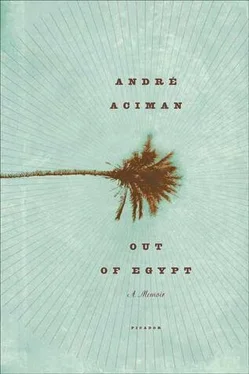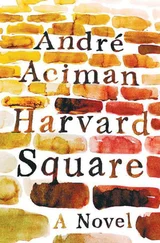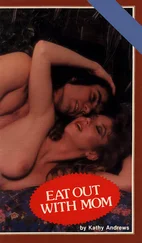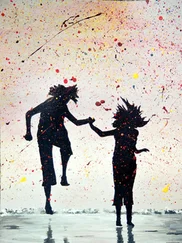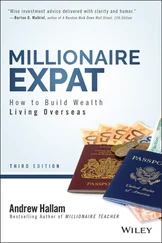Aunt Elsa said she hated Wednesdays. Bad things always came on Wednesdays.
My father said he too had had premonitions, but what had the voice meant about the incident of the stone?
At which point Aunt Flora decided to tell him. Earlier that day we had joined the crowd that lined the Corniche, waiting to get a look at President Nasser, standing for hours in the sun, cheering and waving each time anything resembling a motorcade came around the bend of Montaza Palace. Then we saw him, perched in his Cadillac, waving with a flat, open palm, looking exactly as he did in the pictures. People began to cheer, men and women jumping and clapping, waving small paper flags. A girl in a wheelchair, perched at the edge of the sidewalk almost touching the curb, had been holding a rolledup sheet of paper tied with a green ribbon. Now the president had passed and she was still holding it, looking disheartened and crying. She had failed to drop her written message into his car. Abdou, who had come with us, had noticed her earlier and said she probably wanted the Raïs to pay for an operation or a new wheelchair. Her older brother, equally distraught — and probably blaming himself for failing to maneuver her close enough to the motorcade — was busy telling her it didn’t matter, they would try the next time. “I don’t want to live like this,” she wailed, covering her face with shame as he wheeled her away toward a part of Mandara we did not know.
On our way home a stone hit Aunt Flora on the leg. “Foreigners out!” someone yelled in Arabic. We never saw precisely who had thrown it, but as soon as she shouted, a group of youths immediately began to disperse. The stone had hit her on the ankle, but it didn’t break the skin, there wasn’t any blood. “As long as I can walk—” she kept saying, rubbing her shin with her hand. Then, remembering the bottle of cologne in her bag, she applied some liberally over the bruise, occasionally massaging her leg as she limped along.
No sooner had we reached home that afternoon than we came upon another commotion, this time in our garden, where everyone was screaming, including al-Nunu who, on hearing the sudden noise, had come out of his hut armed with his machete. Al-Nunu was yelling the most, followed by Mohammed and my mother, everyone racing about in the garden, even my grandmother, who was now yelling at the top of her lungs. I asked Gomaa, al-Nunu’s helper and catamite, what was the matter. Out of breath, Gomaa shouted, “Kwalia!”
Quail!
Every autumn, quail would descend on Egypt from as far away as Siberia and, as soon as they caught sight of land, would literally drop from the sky, exhausted. That afternoon a bird had fallen in our garden right next to where my grandmother was having tea with Arlette Joanides and her daughter, who were leaving Egypt and had come to say farewell. Instinctively my grandmother had taken the elaborate needlepoint canvas on which she had been working for over a year and thrown it over the exhausted quail. The bird, though it was faster than the old woman, was too tired to fly away. It kept hopping about our garden until it was joined by two more birds that must have fallen earlier, unbeknownst to my grandmother. This was far better than anything she could have dreamed of, and the old woman began to yell. Everyone came rushing to her rescue until they saw the birds, and then they joined the trapping party.
From adjoining gardens as far back as Rue Mordo we could hear similar screams as everyone at home or on the street dropped whatever they were doing to catch this exquisite manna that tumbled from the heavens each year.
And yet, despite the great joy they brought that day — to Abdou, although he would have to start dinner all over again; to Aunt Flora, who had almost forgotten her wound and was resolved to keep it from my father; and to my grandmother, for whom quail season coincided with the making of fruit preserves — still, the sight of this peerless Egyptian delicacy struggling for life as it tried to elude our frenetic grasp never failed to announce the arrival of autumn and the end of our summer in Mandara.
No one stayed on in Mandara after quail season. By early October, the streets were deserted, with only a few Egyptians, mostly Bedouins, remaining where they lived all year round. Packs of stray dogs — some young enough to have been adopted by summer residents who then left them behind at the end of the season — would come out from everywhere, scrounging for food, sometimes landing at our door, always barking, especially at night. By then, the beaches were completely empty, the Coca-Cola shacks were all closed, and, at night when we drove back from the movies, ours was the only light on our street, a faint, forty-watt flare beckoning from our kitchen, where Abdou would wait up for us, listening to Arab songs on the radio. Sometimes, though, he would have gone back to the city at night, and then there was no light awaiting our return, and Mandara would become a ghost town, and all one heard when my father turned off the car radio, and then the engine, was the sound of our movements in the car, the sound of our steps along the pebble path leading to our door, and, behind the house, down by the bend near al-Nunu’s shack, the sound of waves.
Once in the house, my first impulse was always to turn on the lights in the entry and rush down the oppressive corridor and light up one room after the other — the veranda, the kitchen, the living room, even the radio in my bedroom, hoping to liven the entire house and give myself and my parents the illusion that there were still summer guests in the house who would presently come out of their rooms. One could even nurse the illusion of guests to come.
At midnight our anonymous caller asked whether we had been to the theater. My father told him the name of the film we saw.
We stayed at Mandara very late into the fall that year. We always stayed too long. It was my mother’s way of refusing to admit summer was over. But there was another reason for delaying this year. After Mandara, we had decided not to return to Cleopatra but to move instead to Sporting, so that everyone in the family might be together. My mother was put in charge of selling all the furniture at Cleopatra.
I saw the apartment at Cleopatra for the last time a few weeks later, when my mother asked me to go up with her to set aside clothes for Abdou and Aziza. All of our furniture was now covered in sheets, and the window shutters were closed tight, lending our apartment, usually so sunny in October, a gloomy, sepulchral air, while the old sheets, which I could remember Abdou hastily throwing over sofas and armchairs at the very last minute before leaving for Mandara early that June, looked like tired, old, deflated phantoms. “All of it will be sold,” said my mother with a pert, busy air that could easily be mistaken for anger but which was her way of showing enthusiasm. She loved novelty and change and was as excited now as she had been on moving here five years earlier.
I never met the man who bought all of our furniture, nor did I witness the transaction nor the actual lining up of our bedroom and dining room furniture on our sidewalk at Cleopatra. Aziza said Abdou was the only one who wept. I came back one day after school to find the place empty. “Maybe we shouldn’t have moved,” said my father. His voice sounded different now that the rugs and the furniture were gone.
I asked him if he was going to throw away all those books on the floor. No, he replied. We would take them to Sporting. Meanwhile, he was leafing through what looked like twenty to thirty thick green notebooks, tearing out occasional sheets that he intended to save. I asked him what he was doing. “These are notebooks I kept when I was a young man.” Was he going to throw them away? “Not all, but there are things here I would rather disappeared.” “Did you write anything against the government back then?” I asked. “No, nothing political. Other things,” he said, unable to conceal a tenuous smile. “Some day you’ll understand.” I tried to tell him I was old enough to understand. But I knew what he’d say: “You think you are.” He said he could still remember witnessing his parents’ emptied home thirty years before on the day they had left Constantinople. As had his father seen his own father’s home. And our ancestors before that as well. And so would I, too, one day, though he didn’t wish it on me—“But everything repeats itself.” I tried to protest, saying I hated this sort of fatalism, that I was free from Sephardi superstitions. “You think you are,” he said.
Читать дальше
